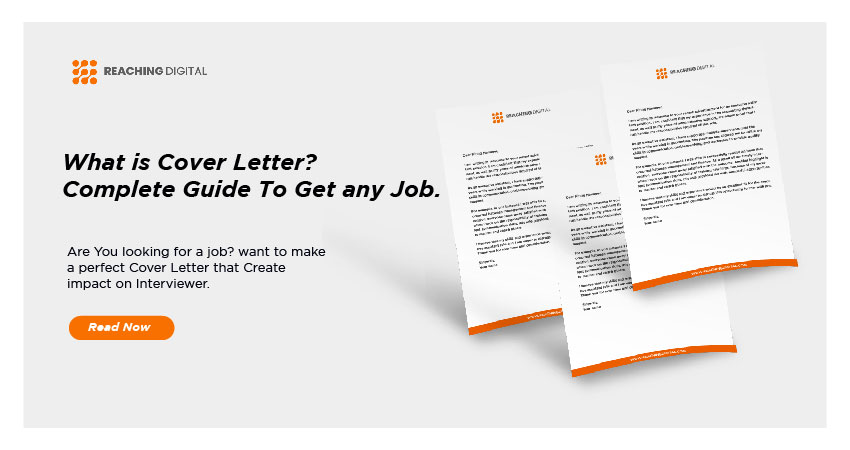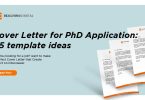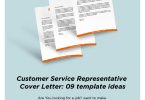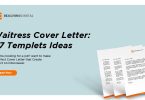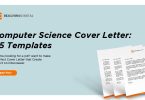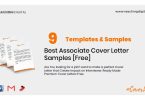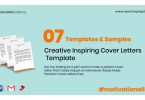Have you been looking for a career change? You’ve heard that a cover letter is a key to getting your foot in the door. But what does it actually mean? And how do you write one? We can help! Our guide will walk you through every step of the process, from writing your first letter all the way through editing and submitting it with confidence.
We know how hard it is to find a new job, so our goal is to make things easier for you. By providing all the information necessary about what employers look for in their employees. You can also learn what makes a good cover letter and how to write one with our guide!
What Is a Cover Letter?
A cover letter is a document sent with your resume to provide additional information on your skills and experience. It’s a way to highlight aspects of your resume that you’d like an employer to know about. But don’t fit on the first page of your resume.
A good cover letter should provide information not found on your resumes. Such as reasons why you are interested in the job, details about your work experience. That aren’t clear from your resume, information on skills relevant to the position, or anything else. Which might help an employer understand why you’re a good fit for the job.
How long should it be? & Whats Include in Cover Letter.
On average, you should aim for three short paragraphs: An introduction, a body, and A closing.
- An Introduction: The introduction should be short one or two sentences. That tell the employer what position you’re applying for and where you found the job listing (and if it’s online, which website). It should also include your contact information: don’t just mention your email address; state it in full and bold at the top of the letter.
- Body Of Cover Letter: The body of your cover letter, where you’ll provide details on your skills and experience, will typically be two to three short paragraphs. For each paragraph, you should focus on one particular point that is relevant to the job listing or hiring manager’s interest. Each point should include a sentence or two describing what it is. Followed by a sentence or two about how you’re qualified for it.
- Closing Statements: Use specific examples to back up your claims. If you’re applying for an IT job and your resume shows that you know several programming languages, tell the employer which ones. If there are some skills not on your resume. But inferred from your cover letter, save them for the closing paragraph. That’s where you can re-emphasize your interest in the position and highlight your enthusiasm for the role.
A good cover letter is tailor to each individual job listing or hiring manager. It’s not something that can be sent with every resume, and it shouldn’t repeat information from your resume word-for-word. If you think your cover letter could be stronger or needs to be revise. There are a number of sites that offer tips and samples for how to write one.
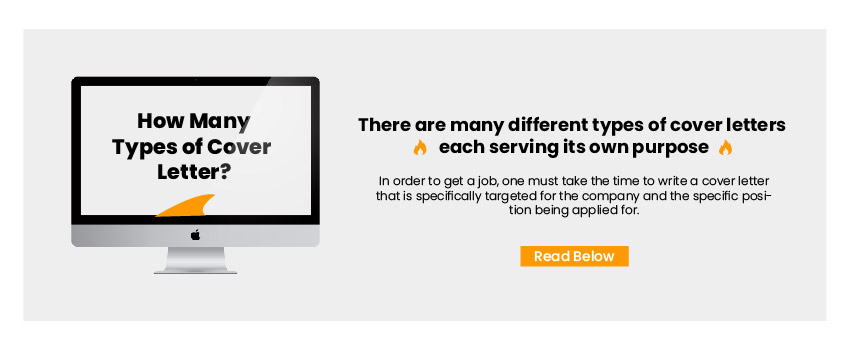
Types of Cover Letter?
People applying for jobs at any level usually send out a generic cover letter. That has been slightly modified to fit each individual job that they apply for. This is not an effective way to get one’s resume notice. In order to get a job, one must take the time to write a cover letter. That is specifically target for the company and the specific position being applied for. Then it could follow that if a cover letter is design for an individual job. Then it could be consider a tailor letter.
There are many different types of cover letters each serving its own purpose. A cover letter is usually the first impression that an employer will get of one’s writing skills. This is why it is extremely important to make a good first impression from the very beginning.
Informational – A informational cover letter can be describe as a brief explanation for why an individual has sent in their resume for a particular job opening. This type of cover letter will not have an introduction paragraph explaining why the individual is writing or where they heard about the job opportunity.
Application – An application cover letter is typically given out by one who has already had an interview, and is writing a brief cover letter to follow up. This brief letter is only a few sentences, and should briefly explain why the employer should consider hiring one for the job.
Motivation- A motivation cover letter can be thought of as an “interest” letter sent to companies that are not currently hiring. A person could send in a motivation cover letter because he or she is interested in working for the company, and wants to keep their name at the forefront.
Follow Up – A follow up letter can be consider a sort of “thank you” note. That a person sends after an interview has been complete. This type of cover letter should thank the employer for giving one the opportunity to interview and confirm one’s interest in the job.
Promotion – A promotion cover letter is given to a current employer, and would explain that one’s role has changed or has been expanded. This type of cover letter mostly contains information that the reader should already know about.
Praise – A praise letter can be written by an employee to their manager, explaining what they have done to deserve a promotion.
Seeking Advice – A cover letter meant to seek advice would explain that one knows the employer, and is wondering if they might be of assistance. This type of cover letter can also be sent by a current employee asking for advice on how they could improve their performance at work.
Research – A research cover letter can be thought of as a request for information. This letter would ask the employer if they could give advice or point one in the direction of other companies who might have similar openings.
Thank You – A thank you cover letter is written to show appreciation and can be used. When sending a response to a position that was not selected for an interview.
Types of Cover Letter Formats
Letters of this kind should make a connection between the contents of the resume and the skills and abilities that will help you succeed in the current position. There are many types of cover letter formats including:
What is a block format?
The block format is the simplest and most straightforward of all cover letters. The objective of this type of cover letter is to highlight work experience, education, and any relevant skills you have that can be applied to the job you are seeking. A good way to present information in the block format is as follows:
Name,
Address,
City, State Zip Code.
Phone Number
Email Address
Objective: To obtain a position as ” accountant at abc corporation.
Summary of Qualifications: My resume and application clearly demonstrate my extensive experience in the financial field and my ability to manage multiple projects simultaneously. Additionally, my experience working in a dynamic and fast-paced work environment has prepared me for this position.
Industry Experience:
Education and Training:
Relevant Skills:
References available upon request.
The block cover letter is by far the easiest of all types of cover letters to compose and typically takes the least amount of time.
What is a semi-block format?
This type of cover letter allows you to highlight one or two key qualifications. That you have that match up with what the job posting is seeking, while still including your contact information and objective statement at the beginning. This is done by creating both a heading and a paragraph for each section. A good way to present information in the semi-block format is as follows:
Name,
Address,
City, State Zip Code.
Phone Number
Email Address
Objective: To obtain a position as “Accountant” at ABC Corporation.
Job Summary/Qualifications:
Industry Experience: Over the course of my career, I have been responsible for managing multiple types of financial records and accounts. In addition to this, my experience working with a variety of people from diverse backgrounds has prepared me for this position as well.
Education and Training: My extensive education in accounting has provided me with a strong foundation for this career. Additionally, my previous work experience has allowed me to hone my skills and further prepare myself for this position.
Relevant Skills: My strong command of financial accounting software, as well as experience with the latest versions of QuickBooks, are two additional qualities that make me a perfect fit for this position.
References available upon request.
The semi-block cover letter takes a bit more time to put together but will make your resume stand out from the rest and allow you to show exactly why you are qualified for the position.
What is a combination format?
The combination cover letter is similar to the semi-block cover letter. In that it allows you to highlight relevant experience, skills, and education. However, this type of cover letter also includes a paragraph describing personality traits or other relevant qualities. That will help you succeed in the position. A good way to include information in the combination format is as follows:
Name,
City, State Zip Code.
Phone Number
Email Address
Objective: To obtain a full-time position as “Accountant” at ABC Corporation.
Summary of Qualifications: My career objective is to become an accountant with years of experience working in the financial sector. I am seeking a company that values hard work, attention to detail, and professionalism. My resume clearly demonstrates my extensive experience in the financial field, as well as my ability to manage multiple projects simultaneously. Additionally, my experience working in a dynamic and fast-paced environment will allow me to thrive at your company.
Industry Experience:
Education and Training: My education has provided me with a strong foundation on which to build on my already extensive experience in accounting.
Relevant Skills: My strong command of financial accounting software and experience with the latest versions of QuickBooks make me a perfect fit for this position.
When you do not have extensive work experience that directly relates to the job at hand, it is important to highlight your personality traits or other qualities tested in the job interview.
References available upon request.
Combination cover letters take more time to compose than the average cover letter that simply highlights relevant experience, but will allow you to stand out from other candidates that only focus on their skills and education.
What is an accompanying resume?
This type of cover letter provides additional information about your qualifications, but will not stand alone. The accompanying resume format should not be used if the letter and resume combination was specifically requested by a job advertisement.
City, State Zip Code.
Phone Number
Email Address
Objective: To obtain a full-time position as “Accountant” at ABC Corporation.
Summary of Qualifications: My extensive experience in accounting, along with strong organizational skills and ability to manage multiple projects will allow me to be a valuable member of your team.
Industry Experience: My internship experiences have helped bolster my already extensive education in accounting, which I have acquired through the University of Hard Knocks.
Education and Training: Relevant Skills: My strong command of financial accounting software, experience working in a fast-paced environment, and experience with the latest versions of QuickBooks all make me a perfect fit for this position. When I am not working on my internship at XYZ Corporation, I enjoy picking up additional responsibilities at ABC Corp.
Additional Information: References available upon request. The accompanying resume should be accompanied by a cover letter that highlights relevant skills, experience, and education for the position at hand. If you are not sure if an accompanying resume needs to be included with yours, it is usually best to simply include one that includes all of your educational information as well as a brief summary of your work history.
Thank you for the opportunity to apply for the “Accounting Intern” position at your company. I am confident that my skills and experience in this field will make me a strong candidate for the job. In addition, I have enclosed a copy of my resume with additional information that outlines my education and experience in the financial sector.
Sincerely,
Kevin Kjaer
Why is a cover letter important?
A cover letter is an important part of your job application as it provides the employer with some insight as to why you are qualified for the position. A well-thought-out and carefully written resume need to have a follow-up. That indicates how successful you will be in the role, and a unique cover letter can help you accomplish that goal.
A poorly written cover letter can spell disaster for your application. While a well-written one can help you get the job of your dreams. There are several guidelines that need to be follow, when writing a cover letter. however, but if you follow them you should have no problem creating an effective one.
What exactly is a cover letter?
A cover letter is an official introduction to your resume. It gives potential employers insight as to why you would be a valuable asset to their company. Often times it contains specific information about the position that you are applying for. When you’re just starting out in the world of job searching. You should realize that every document counts – even a cover letter.
How does a cover letter work?
Cover letters are often ignore by employers as they believe the paper has no real impact on their decision-making progress. But this is not true as an effective resume needs to have a follow-up that will help convince them of your worthiness for the job. A well-composed cover letter can not only make you seem like an excellent potential job candidate. But it can also help you increase your marketability in the eyes of hiring managers.
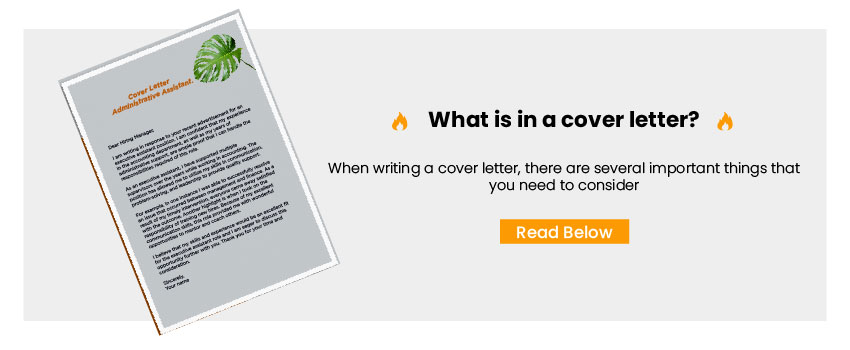
What is in a cover letter?
When writing a cover letter, there are several important things that you need to consider. Including – sending off the wrong message with careless errors or mistakes, driving hiring managers away with poor grammar, or just being too general. The following are guidelines that need to be follow when writing a cover letter:
- Address it properly: The first thing that you will need to do is ensure that the cover letter is address correctly. Many people overlook this part of their application and address it to Ms./Mrs. Last Name, but that is not correct. You should always address the letter to a specific person, whether it be by name or title. The hiring manager will appreciate this attention. To detail and it will help them know that you care enough about your application to take time out of your day to look them up.
- State the purpose: Your cover letter should contain a statement as to why you are sending it along with your resume. You do not necessarily have to state “Please find my attached resume for the position of …”. But you can look at this as an option. If you feel that the hiring manager will appreciate the ease of access that comes from having both documents in one place.
- Include relevant information: Your cover letter should never be more than one or two pages long. It needs to provide the hiring manager with specific details about why you are qualified for the position. You need to understand what they are looking for so that you can best highlight your strengths as a potential employee. This means taking time to research the company and role thoroughly before you write your cover letter.
- Demonstrate skills and accomplishments: Your letter should contain a statement that demonstrates both your professional skill sets. As well as specific examples of how you have used them in previous positions. You can even include information about awards or recognition. That you have received if it applies to the position that you are sending the application off for.
- Don’t make mistakes: Last but not least, do not make any careless errors or spelling mistakes. When you are writing your cover letter. In today’s job market, a single mistake can cost you a job offer and if you want to be taken seriously by the hiring manager then your application needs to be perfect. Proof-read it at least twice before sending it off to ensure that there are no mistakes.
If you follow these guidelines, then your cover letter will be taken more seriously by employers and hiring managers. It is just as important as your resume, so do not overlook this section of the application process – even if it doesn’t seem like it at first glance.
When To use a cover letter
A cover letter is usually only necessary if you are sending your resume via postal mail or email. If you are using a web-based system. Such as those used by most job boards, the company will provide an electronic version of their application form and ask you to upload your own resume as part of the process. In this case, there’s no need to include a cover letter.
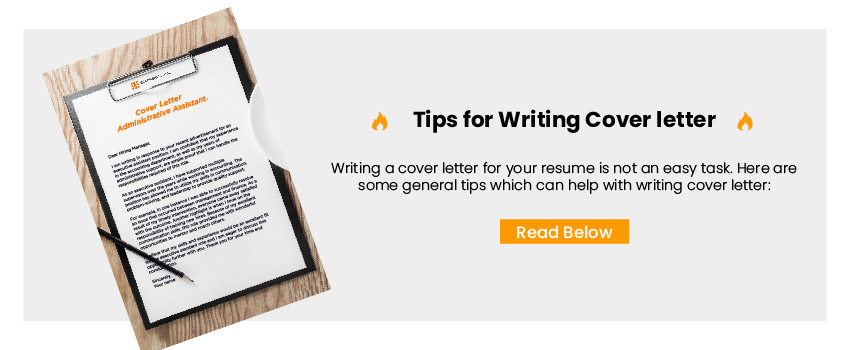
Tips for Writing Cover letter
Writing a cover letter for your resume is not an easy task. Most people have problems understanding what should be mention in the cover letter and what shouldn’t. Even if you are an experienced worker, writing a proper covering letter can be difficult. That’s why it will take some time to prepare one so that it attracts the employer’s attention.
Here are some general tips which can help with writing cover letter:
- Create a good introduction that grabs the employer’s attention;
- Be sincere and display you knowledge;
- Make sure your cover letter is well written and perfect in grammar and style;
- Be concise and to the point. Employers will appreciate this quality in a candidate so don’t try to show off with long sentences or paragraphs;
- Type your covering letter instead of writing it by hand. Typing it will make the process faster and the final product more professional;
- Be sure to proofread your cover letter before sending it. You don’t want to send an unprofessional document that contains typos or grammatical errors.
Make sure you review these tips in order to create an efficient covering letter for your resume. It is worth mentioning that these tips are just general guidelines and there is no such thing as a perfect covering letter. Your Letter is unique because this will Write for this particular job and employer. So make sure to stay close to the requirements given in the ad and you should come up with something amazing.
Some Final Thoughts
Writing a cover letter is not easy, but you can take it one step at a time. If you follow the tips above, your will give yourself an advantage over other candidates. Even if your resume is not perfect or doesn’t contain all that an employer is looking for. Covering letter may be what you need in order to get call for an interview. As long as you are well prepare, your chances of getting this job are high!

